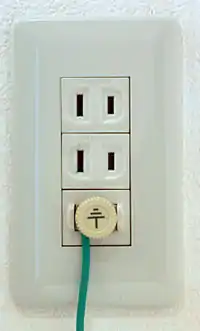outlet
English

An electrical outlet (Japanese).
Etymology
From Middle English outlete, outeleate, ut-lete, derived from Middle English outleten (“to allow, let out, emit”), equivalent to out- + let. Compare West Frisian útlit (“outlet”), Dutch uitlaat (“outlet”), German Auslass (“outlet”).
Pronunciation
- IPA(key): /ˈaʊtlɛt/, /ˈaʊtlɪt/
Audio (US) (file)
Noun
outlet (plural outlets)
- A vent or similar passage to allow the escape of something.
- Something which allows for the release of one's desires.
- Jamie found doing martial arts was a great outlet for her stress.
- 1865, Walt Whitman, “When Lilacs Last in the Dooryard Bloom’d”, in Sequel to Drum-Taps: When Lilacs Last in the Dooryard Bloom’d and other poems:
- Song of the bleeding throat, / Death’s outlet song of life, (for well dear brother I know, / If thou wast not granted to sing thou would’st surely die.)
- A river that runs out of a lake.
- A shop that sells the products of a particular manufacturer or supplier.
- A wall-mounted socket connected to an electrical power supply, at which current can be taken to run electrical devices.
- I had to move the cupboard to get to the power outlet.
Derived terms
Translations
vent
|
release of desires
river
shop
|
wall socket — see wall socket
Chinese
Pronunciation
Polish
Pronunciation
- IPA(key): /ˈaw.tlɛt/
- Rhymes: -awtlɛt
- Syllabification: ou‧tlet
Declension
Portuguese
Spanish
Pronunciation
- IPA(key): /ˈautlet/ [ˈau̯.t̪let̪]
- Rhymes: -autlet
Usage notes
According to Royal Spanish Academy (RAE) prescriptions, unadapted foreign words should be written in italics in a text printed in roman type, and vice versa, and in quotation marks in a manuscript text or when italics are not available. In practice, this RAE prescription is not always followed.
This article is issued from Wiktionary. The text is licensed under Creative Commons - Attribution - Sharealike. Additional terms may apply for the media files.